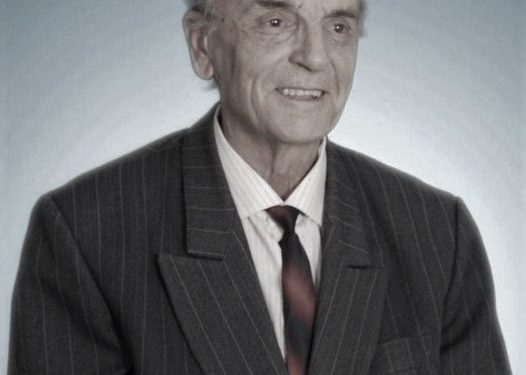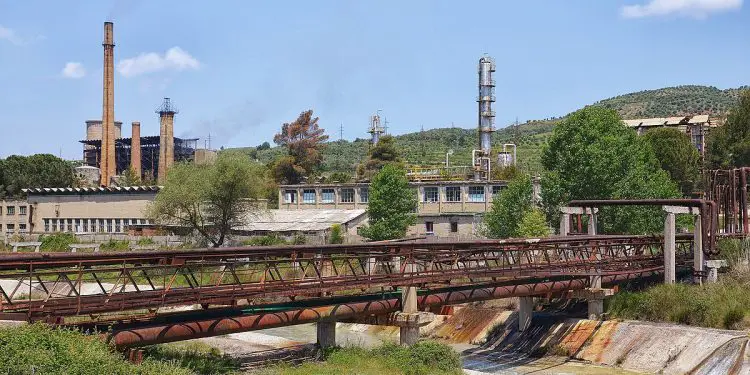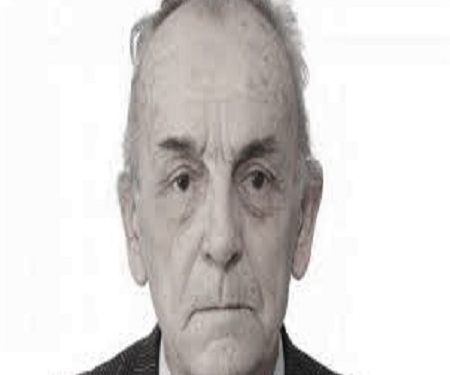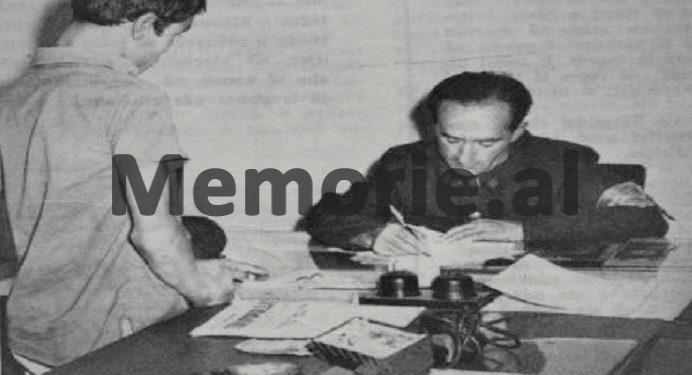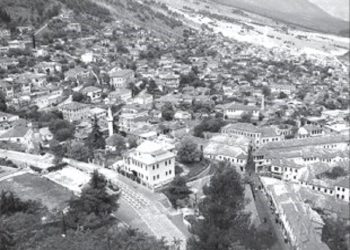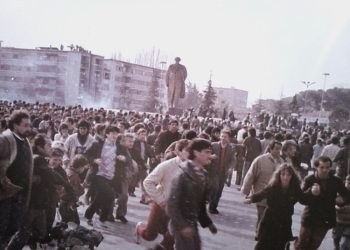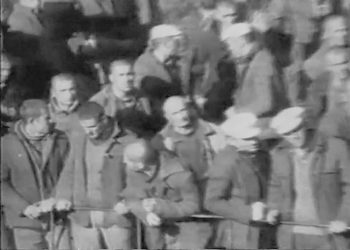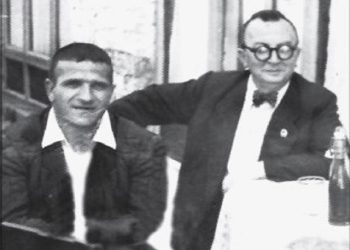By Reshat Kripa
The fourth part
-“People who have never known dictatorship and tyranny find it easy to give in to the rhetoric about freedom, forgetting the simple and terrible reality of oppressing the mind where it exists consciously”.-
Giovani Sartori: “Once again for the theory of democracy”.
Memorie.al/ Robert Krasta, had made it a habit that on every anniversary of his parents, he would go to the cemetery and place a bunch of flowers on their grave. He would look at the picture stamped on the porcelain and start a conversation with them. He had been doing this habit for a long time. The conversation seemed to soothe his soul. He told them about everything that had happened in the family. Sometimes, when he found difficulty in something, he asked them for help, and it seemed to him that they answered him. Perhaps this could be some guess of his own, yet he believed it.
Continues from the previous issue
Ilia stood speechless. He could not find words to answer. Agron noticed and continued:
– I ask for my dignity to be restored. Who uses my name for such games?
– What did you think of doing?
– I will write to them that I have not sent them any letter or any coin.
– You will do very well.
– But I ask that you also move and find the real culprit. Now excuse me. I have to leave because I have a lot of work. Goodbye! She started to leave, but he stopped her:
– Wait, waits. Let’s talk a little about our problems.
– What can we talk about?
– Yes, friend Agron. You are our man, son of a martyr. You are also the chief engineer of the company. We have some information that you have some suspicious people in the company.
– To tell you the truth, I don’t know such people.
– I speak for those two engineers who accompany you, as well as for some others. As the chairman has told them, they belong to that stratum that fought us with rifles at their sides. According to the information we have, they are preparing something.
– I haven’t heard anything. We never talk about issues that conflict with the party line.
– But do you know their family composition?
– What do I need to know? I care about the work and the attitude they carry. That’s enough for me.
– You are wrong. You have to dig deep; you have to be very alert. Do not forget! Class struggle is the driving force of socialist society. Without class war, our entire system is at risk.
Suddenly he had started speaking in the singular.
– When they are like that, how could they finish university? There must be some misunderstanding here, – said Agroni.
– There is no misunderstanding. If once with their maneuvers or by the light-heartedness of some functionary, they were able to graduate from the university, this does not mean that we do not monitor them and expose them if necessary.
– Why should we unmask them? I have been with them for five years. I have never heard any talk, against popular power, from them.
– However, others speak differently.
– And who are these?
– That doesn’t matter. It is important that those who accuse them are conscientious and loyal to the teachings of the party and Comrade Enver. Someday you can even learn their names.
– Maybe I’m not like that?
– I don’t mean it there. But you should be more active. To keep your eyes open and not fall prey to their treacherous tricks. This does not apply only to them. You have to look wider. You are the chief engineer. Your horizon is more distant.
– Then?
– You must cooperate more closely with us to honor your name.
– I don’t understand what you want to say.
– I’ll explain.
He took the typewriter, typed a letter and handed it to her.
– Read it and answer me.
Agron took it and read:
STATEMENT
I, the undersigned Agron Canaj, declare that I am ready to cooperate with the State Security bodies for the detection of the enemies of the party and popular power. I declare that I will denounce any kind of expression declared by anti-government people, which contradicts the norms of our socialist morality and which harms the future of our homeland, won with the blood of our martyrs.
I declare that I made this testimony with full conscience, without any coercion from the responsible authorities, and I consider it a patriotic duty for every honest Albanian.
Signed.
Agron felt a deep disgust for that statement. It felt like it was burning his hand. But he felt a greater disgust for the person who served him, Ilia, that individual who sought to force an intellectual to turn into a man without principles.
For a moment he thought of slapping her in the face and running away, but he held back. He remembered that such a thing could cost him dearly. He thought that diplomacy should be used here. So he did not speak, but pretended to read that statement for the second time.
– Sign it, – said Ilia.
– I think that, in order to work for the party and the homeland, there is no need to sign such statements. We dedicated every day to them. We work for them, realize plans, build socialist Albania.
– Enough with these declamations. We are not in a collective meeting here. You are in front of the State Security bodies and you should think carefully before you speak. Don’t sell us your brains. Ilia’s tone had already changed. His face had changed color. He was no longer his previous interlocutor. He had taken on his true form, that of a man who by any means seeks to achieve what he says. He was no longer standing before him, the son of the martyr of the homeland. He had become an enemy of the people. This enemy had to be shown his place.
– Listen, fellow chief engineer, is you going to sign it or not? I just warn you that, otherwise, we will have other conversations to do together.
– Comrade Ilia, I stand by the first opinion that it is not necessary to sign such a statement. I hope you don’t misunderstand me. This is my last word.
The determination of Agron, of the Ilian steppe. He was not used to being opposed in such cases. He felt himself insulted by this man’s pride. He said with a red face:
– If I leave you two weeks to think, when you come again, you must have your mind in your head. Now go!
Agron left. At home, he told Lumto everything. She was extremely shocked, but did not show herself.
– You did very well to make it clear to him. I don’t think he dares to fall on your neck anymore.
The next day, he found the opportunity and talked to Stefani and Gjergji. After discussing it calmly, they finally came to a conclusion with the opinion expressed by Lumtua. This calmed him down somewhat.
After two weeks, investigator Ilia called him again. The threats were stronger. The letters were completely opened. Before Agron, two alternatives were open. Either he had to agree to cooperate, or he had to consider the consequences that would follow, possibly even imprisonment. The latter shocked him. There were three women in the house. An only Skenderi brother was far away in another city.
– Do as you like, – he told the operative when he was leaving. – I am innocent and honest. My character cannot change at this age that I am now.
When he stepped out into the hallway, he thought he saw the Branch President enter his office. He asked to meet her. He wanted to explain everything. He hoped to find support in him. He told a policeman that he wanted to meet him. He replied:
– Wait here.
He entered the office and returned after a few moments.
– The chairman cannot wait for you as he is busy with an important meeting.
– When can I come to see him?
– I do not know. His work schedule is very busy and I don’t know if he will have time to wait for you. But you turn to operative Ilia. He deals with these problems.
– Thank you, but I solved the problems with my friend Ilia, Agroni said ironically.
He went out into the street and was walking without thinking about where he was going. Ilia’s threats and especially the mayor’s disregard had disappointed him. Where had gone his politeness and measured words spoken a few months ago, when they had coffee together? His attitude today was not a good sign.
His head was boiling. His gall was pounding. He looked around. He was looking to meet someone he knew, with whom he could talk. Maybe Stefan or Gjergji. Maybe Lumton too. She was the only person who could help him in this situation. Only she could soothe the heart wounds she had received. Before his eyes he saw a two-story building. At its entrance was a large sign: HISTORICAL MUSEUM. Go inside. His father was also there. He too had been a battalion commander during the War. He too had fallen in this war. Visited the pavilion of the martyrs of the district. He began to see their pictures, placed on the wall. He stopped in front of one. It was a portrait of a handsome man, dressed in a military uniform. A pair of mustaches grew on his lips, adding to his charm. It was his father.
For the first time, he realized that he looked like him. Tall like him, mustache as well, broad forehead that showed intelligence. He surprised himself that he hadn’t noticed this before. Below the portrait, there was an English military uniform and a “Beretta” type revolver. Three bullet marks were visible on the uniform jacket, in the chest area. A bloodstain surrounded their tracks. On a card was written in a typeface:
“These items belong to the martyr of the National Liberation War, the brave commander of the partisan battalion, Bexhet Canaj, who died on July 12, 1943, fighting bravely against the fascist hordes and traitors of the country.”
He looked at his father’s portrait and two drops of tears flowed from his eyes. How he would like to have him by his side, in that difficult moment. Ask him, consult with him. But he looked at her from the portrait and did not speak. Agroni wanted to hear his voice. He had never had such a desire in his life. This was a special case.
He looked at the picture and for a moment, it seemed as if he said to him – Follow my path, son, and you will come out alive. – Before his eyes, the father of those years appeared. He had grabbed his weapons and went up the mountain for freedom. He had joined the National Liberation Movement, but he also called friends and comrades those who fought under the command of the nationalist forces.
That’s how they had fought on that fateful day. Together with him and by his side, Sabriu, a member of the nationalist forces, had also fallen. They had buried them both next to each other, just as they had fallen. This is how other European countries had acted. In France, the communists of Maurice Torrez fought together with the nationalists of De Gaulle. In Italy, the communists of Palmiro Toliati fought together with the nationalists of Alcide De Gasperi.
After the end of the war, everything was decided by free vote. But for us, the slogan came out: “Power comes from the muzzle of the rifle” and in fact it was solved with its muzzle. All nationalists were declared enemies and collaborators of the enemy. Countless trials took place. The executions followed one another.
Terrible prisons and camps were erected everywhere. To Agron, they reminded him of the famous Nazi ghettos. From the history texts, the names of some prominent men of the country were removed. Their place was taken by the new “heroes” of socialism. Pilgrimages were held for them. Newspapers and magazines were written about them. Radio and television talked about them. Rampant propaganda prevailed everywhere. An unprecedented demagoguery ruled the daily life of the people. And here, demagoguery reigned even here in the museum.
Look at what is written about his father’s murder: “Falled on July 12, 1943, fighting bravely with the fascist hordes and traitors of the country.”
Agron knew the truth about his father’s downfall. In that battle, partisans and nationalists had fought together. Martyrs had fallen from both sides. Among them, the father with Sabri. But after the end of the War, history had changed. Former friends had suddenly turned into enemies.
They even denied Sabri the grave. They had separated his corpse from his father. A barbaric act. All these thoughts seemed to clear his mind.
– Thank you, father! You spoke and showed me the way I should walk. Thank you!
He said these words out loud, but when he remembered that he was in the pavilion of the martyrs, he looked around. Fortunately, at that moment, there was no one in the hall; otherwise they would have taken him for someone crazy.
He went out into the street. Now it was as if he didn’t even feel the worry that had gripped him. His soul was calmer. He wanted to walk and walk endlessly. He didn’t feel tired. Finally he went into a bar and ordered a double cognac. He drank it at once and got up. He continued to walk. It was directed from the hills of the city. Stopped at the highest point. From there, the city seemed like in the palm of your hand. He sat at the foot of a large maple tree. He looked at the city. He knew every inch of it. He was born and raised in that city. He remembered his childhood.
A child mixed with gunshots, with the dead and wounded asking for help. His father’s face flashed before his eyes again. Then it was replaced with that of my mother.
She didn’t last long either, she was replaced by Lumto, who gave way to little Irida. They were his dearest people. He worked for them. He was ready to sacrifice everything for them.
Caught up in these imaginings, he hadn’t noticed that it was night. Darkness had covered the land This reminded him of the darkness that had covered his soul. He got up and went home. They were waiting for him there.
– What happened to you, son? The clock is going to eleven, – said his mother.
– I was with Stefani and Gjergji, – he lied. Mother Gjyla had faith only in them – How is my Iridushka? Did you get any ten today?
– Two fathers, one in physics and the other in literature.
– Good luck! Tomorrow daddy will bring a gift for them.
– The best gift for me is all three of you, – laughed Irida and jumped on his neck.
When they went to the bedroom, Lumtua said:
– Today I received bad news. A friend of mine, who is a director in another school, told me that she had heard in the education department, where she had gone to conduct some relations, talk about me. He had even heard the head of the section talking to one of his subordinates about the possibility of transferring to another school. – Find an empty seat in any seven-year school, – said the boss. I am afraid that they will transfer me to some village school. Memorie.al
The next issue follows




